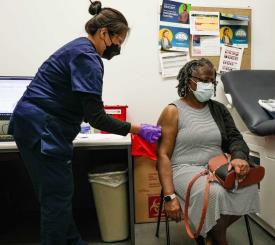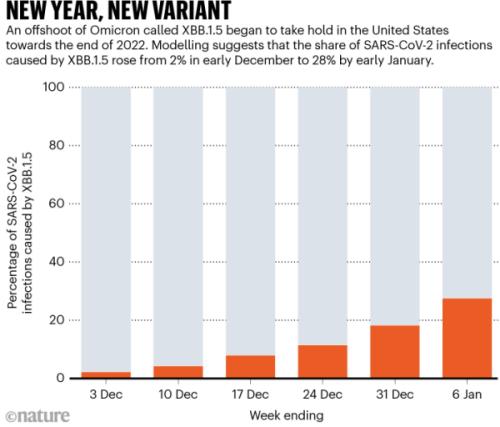 Following evaluation of late December data, the CDC has downgraded the forecast of prevalence of sub-variant XBB.1.5 SARS-CoV-2 from previous estimates. During December a model predicted that the strain would be responsible for 41 percent of infections at the end of 2022. Reappraisal of available data suggests that the strain may be responsible for a range of 23 percent to 61 percent of cases in early January. The new strain is not as yet dominant across the entire U.S. but attained 28 percent for the week ending January 7th. Approximately one third of all COVID cases are at present attributed to Omicron sub-variant BQ.1.1.
Following evaluation of late December data, the CDC has downgraded the forecast of prevalence of sub-variant XBB.1.5 SARS-CoV-2 from previous estimates. During December a model predicted that the strain would be responsible for 41 percent of infections at the end of 2022. Reappraisal of available data suggests that the strain may be responsible for a range of 23 percent to 61 percent of cases in early January. The new strain is not as yet dominant across the entire U.S. but attained 28 percent for the week ending January 7th. Approximately one third of all COVID cases are at present attributed to Omicron sub-variant BQ.1.1.
As of January 4th, the 7-day case average was 67,240, up 16.2 percent from the previous weekly average daily incidence rate. It is noted that with home-testing and inadequate reporting the true incidence rate is higher than the CDC estimate The 7-day hospitalization average for the week ending January 3rd was 6,519, up 16.1 percent from the previous week. Approximately 20 percent of counties, districts or territories had higher COVID levels in the previous week with 42 percent at moderate levels and 38 percent reporting lower levels. The 7-day average fatality rate is 390, up 8.3 percent from the previous week.
 Effective January 4th, 69.1 percent of the population have received the primary vaccination series of two doses. Fifteen percent over the age of 5 years have received an updated booster.
Effective January 4th, 69.1 percent of the population have received the primary vaccination series of two doses. Fifteen percent over the age of 5 years have received an updated booster.
The Centers for Disease for Disease Control and state and local health authorities are monitoring wastewater across a wide range of sites. Almost 60 percent of assays noted an increase through December with the remainder showing either a constant level or a decline.
It is anticipated that novel Omicron variants will continue to emerge. These strains will have an unpredictable capability of evading immunity, and some will demonstrate enhanced infectivity based on their ability to infect ACE receptor cells in human hosts.
Vaccination may not completely provide protection but will most certainly avoid severe clinical outcomes and hospitalization, especially among the elderly. Booster vaccination is recommended together with common sense hygiene precautions in situations involving close contact during travel, sports events and other gatherings.